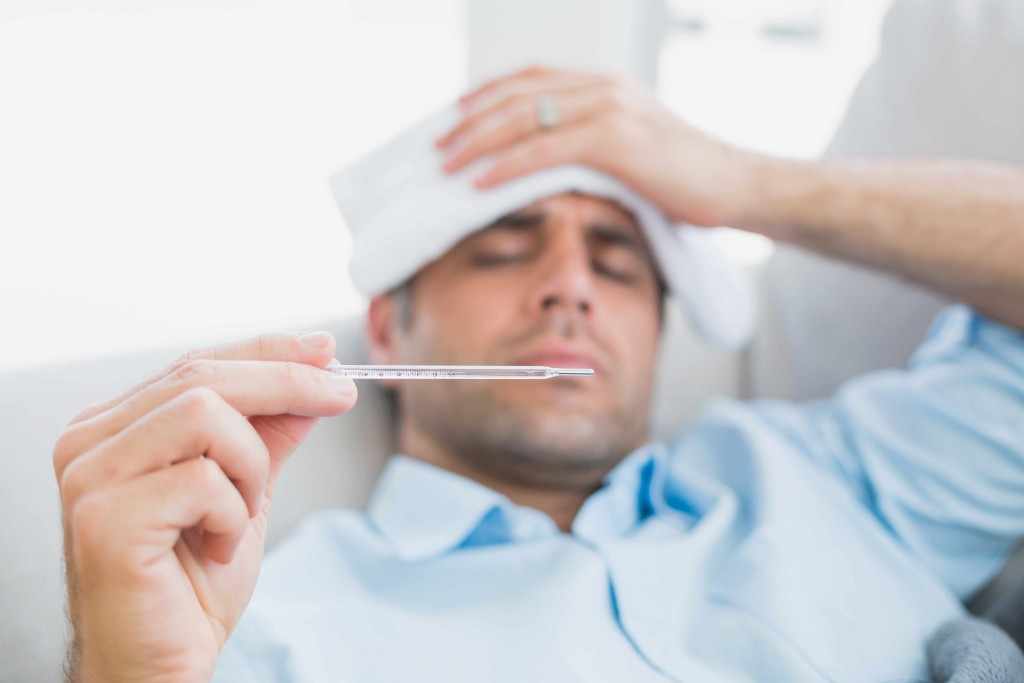-
Featured News
Home Remedies: Fighting a fever

You can try a number of things to make yourself or your child more comfortable during a fever:
- Drink plenty of fluids. Fever can cause fluid loss and dehydration, so drink water, juices or broth. For a child under age 1, use an oral rehydration solution such as Pedialyte. These solutions contain water and salts proportioned to replenish fluids and electrolytes. Pedialyte ice pops also are available.
- Rest. You need rest to recover, and activity can raise your body temperature.
- Stay cool. Dress in light clothing, keep the room temperature cool and sleep with only a sheet or light blanket.
Taking a temperature
To check your or your child's temperature, you can choose from several types of thermometers, including oral, rectal, ear (tympanic) and forehead (temporal artery) thermometers.
Although it's not the most accurate way to take a temperature, you can use an oral thermometer for an armpit (axillary) reading:
- Place the thermometer in the armpit and cross your arms or your child's arms over the chest.
- Wait four to five minutes. The axillary temperature is slightly lower than an oral temperature.
- If you call your doctor, report the actual number on the thermometer and where on the body you took the temperature.
Use a rectal thermometer for infants:
- Place a dab of petroleum jelly on the bulb.
- Lay your baby on his or her tummy.
- Carefully insert the bulb 1/2 to 1 inch into your baby's rectum.
- Hold the bulb and your baby still for three minutes.
- Don't let go of the thermometer while it's inside your baby. If your baby squirms, the thermometer could go deeper and cause an injury.
Over-the-counter medications
In the case of a high fever, your doctor may recommend an over-the-counter medication, such as:
- Acetaminophen (Tylenol, others) or ibuprofen (Advil, Motrin IB, others). Use these medications according to the label instructions or as recommended by your doctor. Be careful to avoid taking too much. High doses or long-term use of acetaminophen may cause liver or kidney damage, and acute overdoses can be fatal. If your child's fever remains high after a dose, don't give more medication; call your doctor instead. For temperatures below 102 F (38.9 C), don't use fever-lowering drugs unless advised by your doctor.
- Aspirin, for adults only. Don't give aspirin to children, because it may trigger a rare, but potentially fatal, disorder known as Reye's syndrome.
You have a fever when your temperature rises above its normal range. What's normal for you may be a little higher or lower than the average normal temperature of 98.6 F (37 C).
Prevention
You may be able to prevent fevers by reducing exposure to infectious diseases. Here are some tips that can help:
- Wash your hands often and teach your children to do the same, especially before eating, after using the toilet, after spending time in a crowd or around someone who's sick, after petting animals, and during travel on public transportation.
- Show your children how to wash their hands thoroughly, covering both the front and back of each hand with soap and rinsing completely under running water.
- Carry moist towelettes or hand sanitizer with you for times when you don't have access to soap and water.
- Try to avoid touching your nose, mouth or eyes, as these are the main ways that viruses and bacteria can enter your body and cause infection.
- Cover your mouth when you cough and your nose when you sneeze, and teach your children to do likewise. Whenever possible, turn away from others when coughing or sneezing to avoid passing germs along to them.
- Avoid sharing cups, water bottles and utensils with your child or children.
When to see a doctor
Fevers by themselves may not be a cause for alarm — or a reason to call a doctor. Yet there are some circumstances when you should seek medical advice for your baby, your child or yourself.
Infants
An unexplained fever is greater cause for concern in infants and in children than in adults. Call your baby's doctor if your child is:
- Younger than age 3 months and has a rectal temperature of 100.4 F (38 C) or higher.
- Between ages 3 to 6 months and has a temperature up to 102 F (38.9 C) and seems unusually irritable, lethargic or uncomfortable or has a temperature higher than 102 F (38.9 C).
- Between ages 6 to 24 months and has a temperature higher than 102 F (38.9 C) that lasts longer than one day but shows no other symptoms. If your child also has other signs and symptoms, such as a cold, cough or diarrhea, you might call your child's doctor sooner based on severity.
- A newborn and has a lower than normal temperature — less than 97 F (36.1 C). Very young babies may not regulate body temperature well when they're ill and may become cold rather than hot.
When in doubt, go ahead and call your child's doctor, whether you think your baby's temperature is abnormally high or abnormally low.
Children
There's probably no cause for alarm if your child has a fever but is responsive — making eye contact with you and responding to your facial expressions and to your voice — and is drinking fluids and playing.
Call your child's doctor if your child:
- Is listless or irritable, vomits repeatedly, has a severe headache or stomachache, or has any other symptoms causing significant discomfort.
- Has a fever after being left in a hot car. Seek medical care immediately.
- Has a fever that lasts longer than three days (in children age 2 and older).
- Appears listless and has poor eye contact with you.
Ask your child's doctor for guidance in special circumstances, such as a child with immune system problems or with a pre-existing illness. Your child's doctor may also recommend precautions if your child has just started taking a new prescription medicine.
Adults
Call your doctor if your temperature is 103 F (39.4 C) or higher, or if you've had a fever for more than three days.
In addition, seek immediate medical attention if any of these signs or symptoms accompanies a fever:
- Severe headache
- Severe throat swelling
- Unusual skin rash, especially if the rash rapidly worsens
- Unusual sensitivity to bright light
- Stiff neck and pain when you bend your head forward
- Mental confusion
- Persistent vomiting
- Difficulty breathing or chest pain
- Extreme listlessness or irritability
- Abdominal pain or pain when urinating
- Muscle weakness or sensory changes, which might indicate a problem with your nerves, spinal cord or brain function (focal neurologic deficit)
- Seizure
- Any other unexplained signs or symptoms
This information is written by Mayo Clinic Staff.







